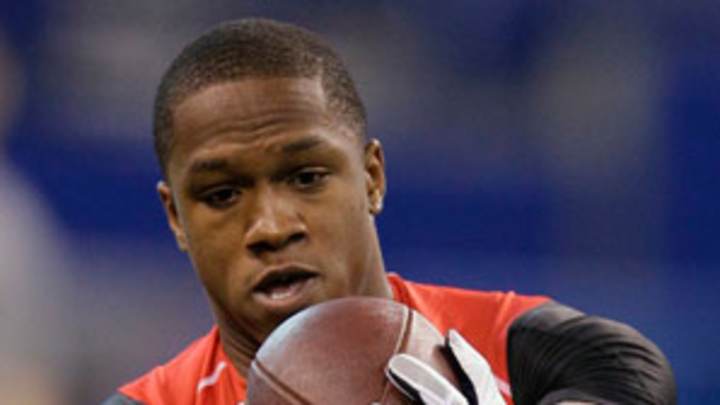O.J. Murdock's suicide hits home for former S. Carolina teammate


You can picture them now, living together and laughing with everybody, a world of possibility in front of them. In the summer of 2005, O.J. Murdock joined the South Carolina Gamecocks as a freshman wide receiver. So did Kenny McKinley. They sat in the same meetings. Ran the same drills. Lived together, with two other players, in East Quad.
"Definitely were good friends," said Freddie Brown, another freshman receiver on that team.
On Sept. 21, 2010, McKinley used a .45-caliber semi-automatic handgun to kill himself. He was on the Denver Broncos' injured reserve list. He was 23.
Monday, Murdock was found dead in his car outside his high school in Tampa. Police say he apparently used a gun to kill himself. He was on the Tennessee Titans' roster but had not reported to camp. He was 25.
"Both of them were great people to be around, which makes this so tough," Brown said. "It's almost like you've gotta think about both of them now. I don't know. It's almost like opening [a] wound and putting something else in it ... You feel so sorry for the families."
You can understand if the world seemed off-balance to Brown on Monday. Almost two years have passed since McKinley took his own life. Brown rarely discussed it with Murdock or anybody else.
"We don't touch that," Brown said. "Period. When you are talking to old friends, you know the situation, but we don't like to visit that too much. We like to focus on the good times about it."
McKinley finished his career at South Carolina and became a star. Murdock had star potential -- Brown said "he might be the fastest guy I've ever seen in person" -- but in 2006, Murdock was arrested for shoplifting and was later dismissed from the team. For fans, dismissed players are history. But to the players who literally bled and sweated with them, friendships endure.
Imagine losing a college friend to suicide. After the shock and mourning, you might do what Freddie Brown did: put the tragic end in a box and tuck it away, so you wouldn't have to deal with it again. Nobody wants to remember a friend by his death; much better to honor the life. Brown kept in touch with Murdock, but he doesn't really know how Murdock reacted to McKinley's suicide -- if he put it in a box and tucked it away, if he was haunted by it, or if he thought for a long time that he might do it himself. He just knows what we all know: Murdock ended his life the same way McKinley did.
They were not Freddie Brown's best friends. But these are the kinds of relationships that last for decades, through reunions, chance meetings and occasional text messages. At least, they should.
Brown coaches receivers at Wofford now, and he recruits Tampa and Orlando. He recently called Murdock to ask about high schools and places to go in Tampa, Murdock's hometown. Murdock apparently just sat outside one of those high schools and ended his life.
"You never see it coming," Brown said. "I know I wasn't close enough to say I would even know the warning signs to begin with ... you just don't expect it from certain people. Two guys always smiling, make you happy about yourself."
This will lead to the same questions we asked after former Chargers star Junior Seau took his life, and after former Bears star Dave Duerson took his life, and after high school and college players took their lives -- and sadly, that we will ask again.
Did Murdock suffer from concussions -- diagnosed or undiagnosed?
Did those concussions cause chronic traumatic encephalopathy, or brain damage?
The questions are fair. But Freddie Brown isn't asking them right now.
"I just want to say how good of a person he was so people understand that," Brown said.
After McKinley died, reports emerged that he had racked up gambling debts, and was depressed about an injury. Brown wasn't much interested then. He still isn't.
"I really don't know the details," Brown said. "I never wanted to know. People want details, and to make judgments. I was never interested in hearing details. It is still hard to talk about now. Especially today. Honestly, I don't even know how much information I can give you."
In a few weeks, Brown will coach his players at Wofford. It isn't the Southeastern Conference, but college freshmen have a lot in common, no matter where they enroll or how fast they run. You can picture those Wofford players now, living together and laughing with everybody, a world of possibility in front of them. Freddie Brown will watch them as closely as he can.
